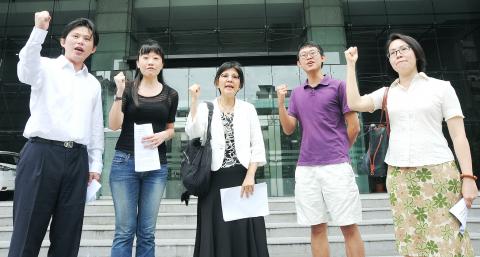|
Activists say KMT
guilty of deception
QUESTIONING PRIORITIES: The protesters are irate
that the KMT has gone back on a written promise to focus on a bill to ban media
monopolies in the extra session
By Shelley Shan and Loa Iok-sin / Staff reporters

Activists yesterday hold a press
conference in front of the National Communications Commission in Taipei to
protest against the Chinese Nationalist Party (KMT) caucus’ failure to make
anti-monopoly media legislation a priority during legislature’s extra session.
Photo: Liu Hsin-de, Taipei Times
Activists against media monopolization
yesterday accused the Chinese Nationalist Party (KMT) of trying to fool the
public by failing to honor its promise to list anti-monopoly bills among
priority legislation for the extra legislative session that starts today.
“The KMT government changes its mind often, finds excuses and fools the public.
It is making me extremely mad,” Academia Sinica research fellow Huang Kuo-chang
(黃國昌) said during a demonstration outside the National Communications
Commission’s (NCC) headquarters in Taipei.
He said that civic groups and activists were very excited when an anti-monopoly
media bill proposed by the commission passed legislative committee review on May
30, with full support from commission Chairman Shih Shih-hao (石世豪), as well as
KMT legislators such as Yang Li-huan (楊麗環) and Lo Shu-lei (羅淑蕾).
“Despite having agreed in writing to make anti-monopoly media legislation a
priority, the KMT made a 180 degree turn as the extra session approached, saying
that passing such legislation ‘is not an urgent necessity,’” Huang said.
“The KMT should stop fooling the public and honor its promises by making
anti-monopoly media legislation a priority bill,” he said.
Huang said some media outlets have attempted to influence public opinion by
saying that media monopolization was a non-issue. One outlet gave the issue
extensive coverage last year, but it was not mentioning it now, he said.
“I seriously question if this media outlet was serious in opposing
monopolization of the media,” he said. “If it only spoke for itself out of its
own interests, then what makes it different from Want Want China Times Group
chairman Tsai Eng-meng (蔡衍明), whom we opposed?”
The draft should be put on the agenda for the extra session, he said, adding
that the commission cannot avoid its responsibility to help push through the
legislation.
“If the commission chairperson has neither the desire nor the power to continue
pushing the bill at the legislature, then please step down like a responsible
politician,” he said.
Flora Chang (張錦華), a journalism professor at National Taiwan University, said
the arguments of the Chinese-language China Times and United Daily News that the
anti-monopolization media act was unnecessary because monopolization is not an
issue in Taiwan.
“It appears that [controversial] media acquisitions have temporarily ceased, but
that does not mean that there will not be any large media mergers in the
future,” she said.
“The arguments from the two newspapers seemed to be saying that we don’t need
buildings that are fireproof and can withstand earthquakes because there are no
fires or earthquakes now,” she said.
Chang said that allowing media conglomerates to acquire media outlets will only
worsen the quality of TV programs, given the way that some large media groups
try to boost ratings by emphasizing their crime reports.
The draft act would have facilitated the development of digital media
convergence because it requires to cable TV service operators to set aside 1
percent of their revenue to establish the Media Content Diversity Development
Fund, but lawmakers deleted those articles, she said.
Eve Chiu (邱家宜), executive director of the Excellent Journalism Award Foundation,
said she hoped the deleted articles would be put back in the legislation in the
extra session.
“This fund would help develop the nation’s media content industry,” Chiu said.
“Our singers would not need to go to China to join singing contests.”
Chiu said that many Taiwanese actors are forced to look for jobs in China
because the nation’s TV stations are unwilling to spend money producing dramas
anymore and prefer to broadcast South Korean or Chinese shows instead.
|
![]()
![]()
![]()